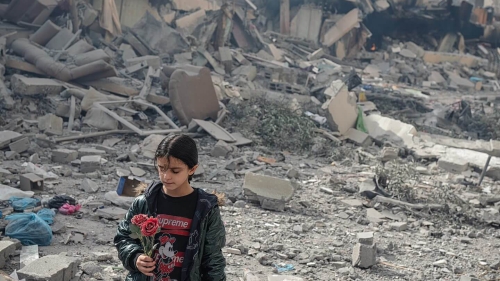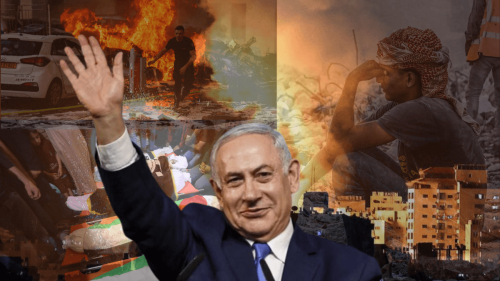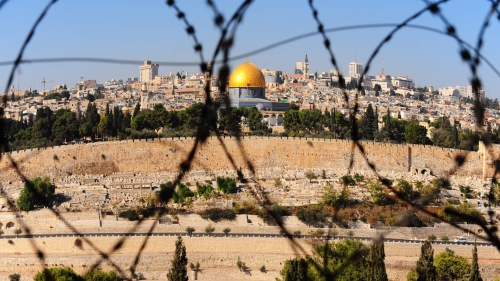Blaming the Victim
The main fallacy of the so-called Israeli-Palestinian peace talks in the last 12 years has been the complete omission or the indefinite postponement of fundamental Palestinian demands - demands sustained and cemented by international law and most recently by the July 2004 ruling of the International Court of Justice.
The problem lies in the Israeli occupation of Arab lands, Palestinian and others. It has invited a legacy of violence and counter violence that has claimed the lives of thousands of Palestinians and Israelis. It has systematically and intentionally destroyed any chance for peace. It insisted to punish the victim for the sins of aggressor.
Palestinians are victims, and their rights, security and welfare should be the priority of the international community. Israel has no right to demand security from its victims; it lost that right the moment it breached international law when its tanks rolled onto Palestinian land.
Unfortunately, however, it is as if the opposite were true. This dreadful habit of blaming the victim has also defined US foreign policy and media discourse for years: Only if Palestinians would unify their security forces, clamp down on terrorism, reform their political institutions, cease incitement and put down their weapons and become more democratic. Only then could they become worthy peace partners. But even then, Israel is under no obligation to do much, since democratic or otherwise, the mere existence of Palestinians is problematic.
This is not an exaggeration. The fact that the birth rate among Palestinians is higher than that of Israelis is termed a "demographic bomb", a problem in the eye of Israel that must be countered by any means necessary, including the fencing off and the caging of Palestinian towns and villages to keep the unwanted multitudes of people out of Israel's domain, while keeping Palestinian land.
The occupied territories make up 22 percent of the size of historic Palestine. But much of the little remaining has been stolen throughout the years, ethnically cleansed of its Palestinian inhabitants to make room for Israeli settlements, all illegal under international law.
Arafat's death on Nov. 11, 2004 has indeed "revived hope." But by hope Israel and its friends mean the hope of returning to the Oslo which has yielded nothing but a few symbolic gestures to the Palestinians.
Israel's real motives behind the impetus in the peace process are anything but a secret, and thus must not be seen as a Palestinian construct. While Israel is congratulated for its courage and "painful compromises" in deciding to "disengage" from Gaza, Israeli officials spoke openly of Israel's dishonest objectives of wanting to partially withdraw from Gaza to simply strengthen its grip on the West Bank.
Strangely enough, it was this repugnant Israeli ruse that was translated (thanks to Israel's friends in the media and in the US administration) into an Israeli gesture of good will. As revolting as the Israeli government's intentions are, they supposedly placed the ball in the Palestinian court. Palestinians are now expected to reciprocate for an illusion deprived of any substance or value.
A just peace is indeed possible, but not according to the current standards, which the Palestinian Authority has sadly accepted. If the two-state solution is to work, Israel must dismantle all of its settlements from East Jerusalem, the West Bank and Gaza and withdraw to the June 1967 borders in accordance with UN resolutions 242 and 338. Palestinian refugees must be given the choice to return to their land in accordance with UN Resolution 194. The Israeli wall must come down in accordance with the ruling of the International Court of Justice of July 2004.
Israel must also accept its responsibility for Palestinian dispossession and suffering for the last five decades.
The international community must do all it can to ensure the implementation of the law it helped draft.
Palestinians on the other hand, must continue to create alliances among peace forces around the world, including Israel itself, and under no circumstance should they forfeit their right to defend themselves.
Shortly before his untimely death, Palestinian-American Professor Edward Said wrote in Al-Ahram Weekly: "So far all we hear is that Palestinians must give up violence and condemn terror. Is nothing substantive ever demanded of Israel? Can it go on doing what it has without a thought for the consequences? That is the real question of its existence: Whether it can exist as a state like all others, or must always be above the constraints and duties of all other states in the world today. The record is not reassuring.
Ramzy Baroud is a veteran Arab-American journalist. A regular columnist in many English and Arabic publications, he is editor-in-chief of PalestineChronicle.com and program producer at Aljazeera Satellite Television.
He is also the editor of the anthology: "Searching Jenin: Eyewitness Accounts of the Israeli Invasion."
To buy "Searching Jenin: Eyewitness Accounts of the Israeli Invasion" CLICK HERE
Related Suggestions
Well that is the question of the millenia. And once that question is answered that will be the end game. The millenia will belong to us.
But we will not claim it as conquerers. Rather as care takers. For that is what we Muslims are supposed to be. We are supposed to be the "vicegerents" or "Khaliphah" of Allah on earth. Every victory to everyone on this earth is a trust. And once we accept that responsibility, we will know that the only right thing to do is be united under God and help each and every one of our Human brothers. Aameen

















